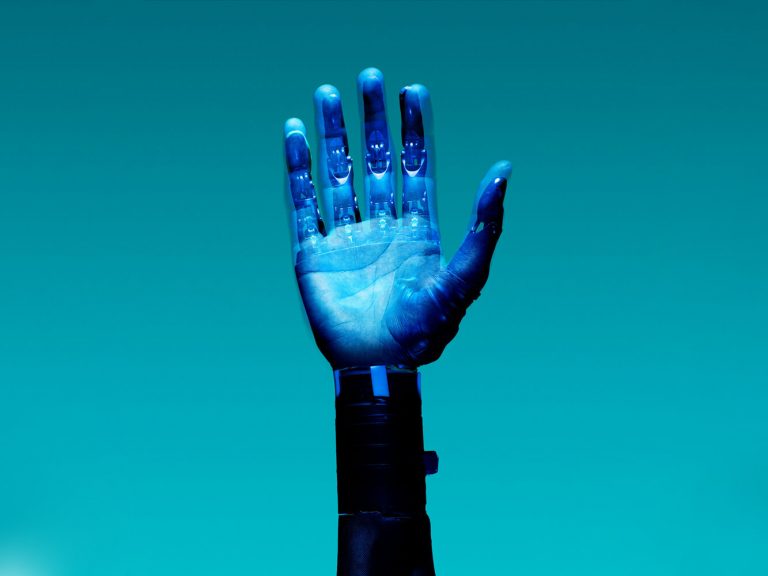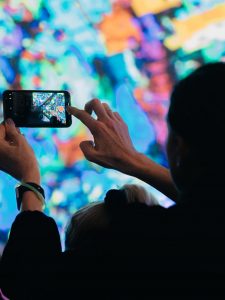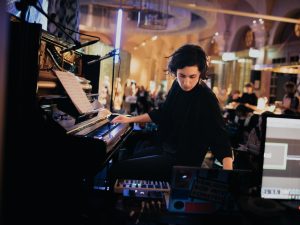How are smart machines changing us and our future? Today, we use machines and artificial intelligence on a daily basis, often without realising it. Algorithms and computer programmes are the base of all digital communication.
The way humans communicate is very different from the language machines and computers understand. While we gesture and read each other’s emotions, computers have traditionally only been able to understand code and numbers. But today’s developments in AI mean that we can communicate with machines in a similar way to how we talk to the people around us. How does collaborating with AI in everyday life affect us? Will we see machines and AI as an integral part of ourselves rather than just tools? Can smart machines help us get results that we would not have been able to achieve on our own?
Welcome to Science Today – a recurring afterwork that kick-starts the brain and the weekend with today’s most exciting research and some of Stockholm’s best DJs. Science Today invites PhD students and postdocs from Karolinska Institutet (KI), Chalmers University of Technology, Royal Institute of Technology (KTH) and Stockholm University (SU) to present their research on stage.
In this eighth edition of Science Today, we enter the Reaktorhallen at KTH and explore the theme of Man and Machine. Reaktorhallen is the original site of Sweden’s first nuclear reactor, the research reactor R1. Today it is used as a creative meeting place.
Speakers
Maksymilian Michal Kuzmicz, PhD in Law, Maria Skłodowska-Curie Action project visual. Stockholm University.
Subject: Privacy-Aware and Acceptable Video-Based Technologies and Services for Active and Assisted Living (AAL). Legal aspects of AAL and new technologies, including data protection, AI regulation, consumer protection and law. How can law be a conflict management tool useful to address conflicts of interests. What are the challenges of developing human-like AI? How can we ensure protection of fundamental rights, including intellectual property and how do we deal with issues of liability?
Jonathan Al-Saadi, PhD Department of Clinical Neuroscience. Karolinska Institutet
Subject: Direct parenchymal delivery using next generation endovascular techniques – minimally invasive and efficient method for targeted cell and gene therapy. Heart failure is devastating, and today there is no curative treatment. In order to improve the prognosis of heart failure and regenerate the myocardium we have developed an innovative platform technology capable of protein production within solid organs at levels 500 times higher and for longer periods than traditional gene therapy methods.
Sahba Zojaji, Ph.D. in Computer Science, with a focus on Human-Computer Interaction. KTH-Royal Institute of Technology.
Subject: Exploring the Dance of Humans and Machines in the era of AI. Throughout the evolution of human-machine collaboration, the focus has transitioned from physical tasks to mental and creative aspects. Initially, machines were primarily utilized for automating repetitive physical tasks. Today, AI doesn’t only assist in complex mental tasks but also collaborates with humans in art, music composition, and scientific discovery. This is a shift from mechanization to augmentation that fosters innovation. In an interactive presentation, together, Sahba Zojaji will explore this progression and its implications for the future of human-machine interaction.
Programme
17:00 Welcome to Reaktorhallen. Mingle and music by DJ Malin Evrenos (Y+M)
18:00-19:00 Conversation on stage.
19:00-20:00 After party in Reaktorhallen with DJ Malin Evrenos (Y+M)
Presentations and talks will be in English. The talk will be led by Olof Somell of the Nobel Prize Museum.
Tickets
Book your tickets here. A valid membership is required for a member ticket. Please show your membership card at the entrance. Purchased tickets are not refundable.
Food and drink
For this Science Today, we are offering food and drink pre-orders until April 17. Show your confirmation with QR code to pick up your pre-order on site. We are now happy to announce that it will also be possible to buy a limited range of food and drinks during the event.
Photo policy
The Nobel Prize Museum photographs, films and broadcasts live many of our events. The Nobel Prize Museum may use the material in our operations, communication channels, marketing and in social media. Contact us if you have any questions about this.


